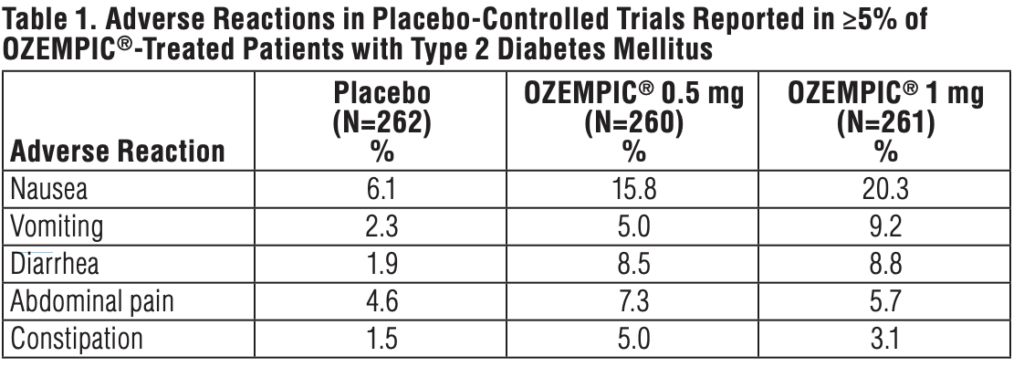Embarking on a journey with Ozempic brings with it a wave of hope for many.
However, amidst the promising outcomes lies a less talked about, yet fairly common side effect: diarrhea.
It’s an uncomfortable topic, one that might even be a little embarrassing to discuss, but it’s crucial for those experiencing it to know they’re not alone.
Does Ozempic Cause Diarrhea?
Yes, Ozempic can cause diarrhea. In clinical trials, approximately 8% of people experienced diarrhea while taking Ozempic (source).
In fact, diarrhea was reported as the third most common side effect, following nausea and vomiting.

Clinical Trial Data on Ozempic Side Effects
During clinical trials, 8% of people on Ozempic experienced diarrhea.
What Can You Do About It?
If you\’re experiencing diarrhea as a side effect of Ozempic, here are several strategies you can try to manage or alleviate this symptom:
- Hydration: Diarrhea can lead to dehydration, so it\’s important to drink plenty of fluids. Water, clear broths, and electrolyte-replenishing beverages can help maintain hydration levels.
- Dietary Adjustments:
- Eat bland foods: Bland foods like bananas, rice, applesauce, and toast (BRAT diet) can help firm up stools. These foods are easy on the stomach and can help reduce diarrhea.
- Limit fatty, spicy, and fried foods: These types of foods can aggravate your digestive system and exacerbate diarrhea.
- Fiber: Soluble fiber found in foods like oats, apples, and carrots can help absorb water and add bulk to stools. However, insoluble fiber (found in whole grains, nuts, and vegetables) can sometimes worsen diarrhea, so you may need to adjust your fiber intake accordingly.
- Medication Adjustment: Talk to your healthcare provider about your symptoms. They may adjust your Ozempic dosage or suggest a different timing of administration. In some cases, they might consider prescribing a different medication.
- Over-the-counter Medications: While you should always consult with your healthcare provider first, medications like loperamide (Imodium) can help control diarrhea. However, these should be used cautiously and under the guidance of a healthcare professional, especially when dealing with medication-induced diarrhea.
- Probiotics: Probiotics can help restore the natural balance of bacteria in your gut and may alleviate symptoms of diarrhea. They are available in yogurt, fermented foods, and as supplements. However, it\’s a good idea to discuss with your healthcare provider before starting any new supplement.
- Monitor Your Symptoms: Keep track of your symptoms and any foods or activities that seem to worsen them. This information can be valuable for your healthcare provider in managing your treatment effectively.
How Long Does Diarrhea from Ozempic Last?
The duration of diarrhea caused by Ozempic can vary from person to person. For some, the side effect may be transient, lasting only a few days to a couple of weeks as the body adjusts to the medication. For others, it might persist for a longer period.
It’s important to note that gastrointestinal side effects like nausea, vomiting, and diarrhea are most common when first starting Ozempic or after a dose increase, and they tend to decrease over time.
How long does Ozempic diarrhea last?
Nausea, vomiting, and diarrhea are most common when first starting Ozempic or after a dose increase, and they tend to decrease over time.
If the diarrhea is mild and manageable, you might find it resolves on its own as your body gets used to the medication. However, if it’s severe or lasts longer than a few weeks, it\’s crucial to consult with your healthcare provider.
They may offer strategies to manage the side effect, adjust your dosage, or explore alternative treatments to ensure your comfort and health are maintained.
It’s crucial to communicate openly with your healthcare provider about any side effects you\’re experiencing, as they can offer personalized advice and adjust your treatment plan to better suit your needs.





